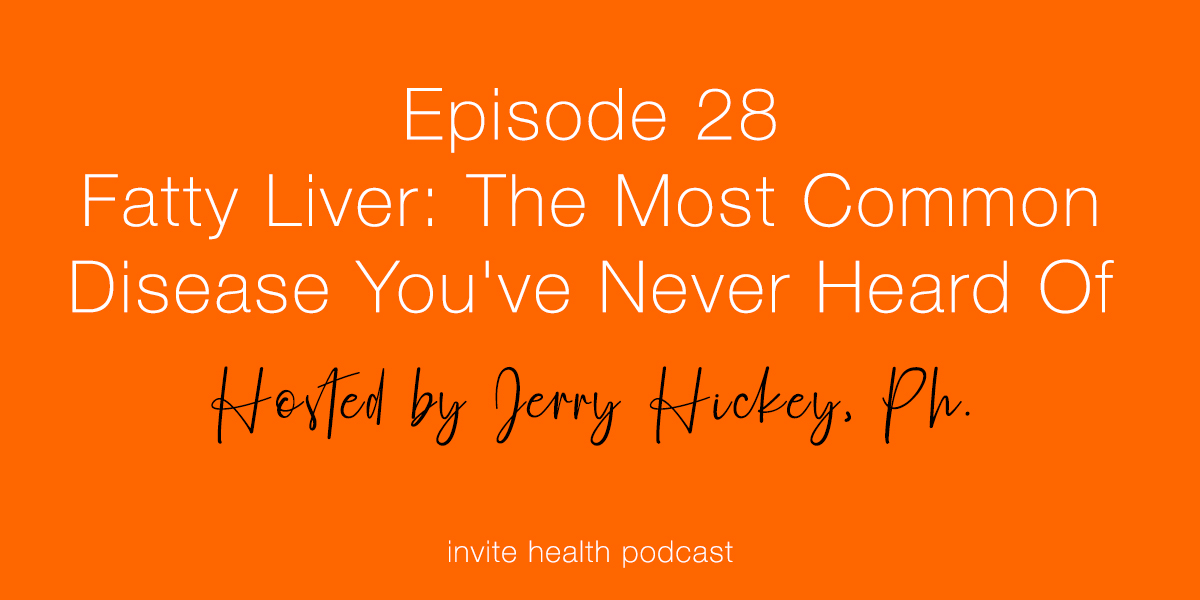Fatty Liver: The Most Common Disease You’ve Never Heard Of – Invite Health Podcast, Episode 28

Invite Health Podcast, Episode hosted by Jerry Hickey. Ph
Subscribe Today!
I remember a time when healthcare practitioners shrugged their shoulders at fat in the liver. But a large amount of people do have fat in their liver and it does become quite dangerous. In this episode, we’ll discuss how it would be possible to have a fatty liver and not know about it, who’s at risk and more!
The Function of the Liver
The liver has hundreds of functions, including storing vitamin D and sugar, creating hormones and bile acids, and also filtering your blood. Of course, the liver is very important for detoxifying, or removing toxins from the body. To support a healthy liver, you should eating cabbage and beans and drink plenty of tea and water to help the liver process chemicals and toxins.
But the liver is faced with many challenges throughout the day, and is prone to damage. Because of that, it must great regenerative ability.
Fatty Liver Disease
Fatty liver is more common than you realize. According to the Mayo Clinic, up to 100 million people in the U.S. have fatty liver.
At least 1 out of 4 adults in the United States have a fatty liver. That’s more than diabetes and arthritis rates combined. The scary part? Many people who have it, don’t even know that they do.
-Jerry Hickey, Ph.
Fatty liver disease is simply a build up of fat in your liver. The fat cells (usually in the form of triglycerides) invade your liver and kill healthy cells, which is then replaced by scar tissue. One type of fatty liver disease is what you get from drinking too much alcohol. The other is non-alcoholic fatty liver disease and this is what is impacting so many Americans today. The extra fat is triggering changes that stop your liver from working well (impacting the removal of toxins), which can make you sick.
This disease can develop into NASH – Non-alcoholic steatohepatitis. This is when your liver gets swollen and leads to pain, severe fatigue and cirrhosis, which can all increase your risk of liver failure and even liver cancer.
Who’s At Risk?
Individuals who eat many processed foods, who commonly drink sugary beverages (fructose), people with high blood triglycerides, high cholesterol, obesesity, pre-diabetes and diabetics – without ever touching alcohol. Here’s the problem – you may not know you have it, because the symptoms are difficult to pinpoint to the disease itself. You may feel pain in your belly or might have severe fatigue or appetite loss.
A typical lab test won’t catch it. You need an ultra sound or a CT scan for the liver, called a Contrast-enhanced ultrasound, an enhanced ultrasound that measures the stiffness of your liver.
The best recommendation to decrease your risk is of developing this fatty liver disease is to lost weight, exercise, and of course – do not drink alcohol. Green tea, eating vegetables, beans and legumes in general are good dietary practices to add to your diet.
Tocotrienols for support of a healthy liver
The Mayo Clinic reports that Vitamin E may help fatty liver. Tocotrienols are a version of Vitamin E, has proven to help reverse fatty liver. These are a type of Vitamin E that were discovered in 1964. Unlike regular Vitamin E, you don’t need that much tocotrienols to achieve good health benefit. Tocotrienol has been shown to be a very powerful anti-inflammatory antioxidant.
Patients with FLD have a much higher risk of having a cardiovascular event. Dr. Daniel Pastory, MD, MPH, a very well-known researcher, published this finding in the Journal of Clinical Gastroenterology and Hepatology. Nine hundred consecutive patients (with a mean age of 56 years old) were followed for 41 months, yet researchers were confident that they were going to have cardiac events within this time period. The incidents of stroke and heart attack is twice as common in patients with fatty liver disease.
Thank you for tuning in to the Invite Health Podcast. You can find all of our episodes for free wherever you listen to podcasts or by visiting www.invitehealth.com/podcast. Make sure you subscribe and leave us a review! Follow us on Facebook, Twitter and Instagram at Invite Health today. We’ll see you next time on another episode of the Invite Health Podcast.
Key Notes
- Information about liver enzymes
